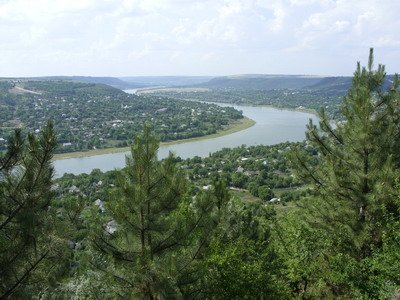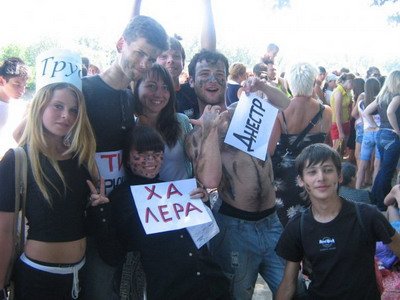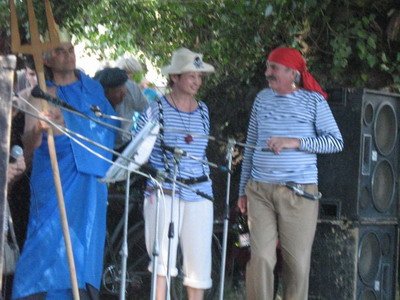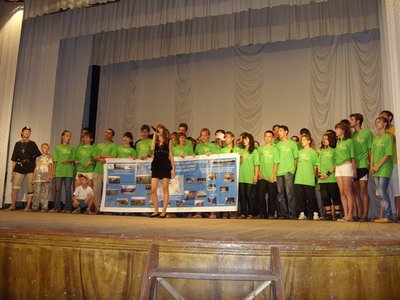|
Happy birthday, the river! 
The ecologists think that soon the Dniester will disappear.
Sturgeon lived in the Dniester: Formerly sturgeon and beluga lived in the Dniester. It was only 50-60 years ago. The river was navigable, clear and full of valuable species of fish. Only imagine: sazan and bream were fished with baskets and even by hands in shallow in hungry post-war years. Now the under water world of the biggest Moldavian river changed out of all recognition. The number of marketable fish of the low Dniester reduced catastrophically. If the catch of 1945-1950 is considered as 100 per cents, at the beginning of the 20th century it was 1 per cent. The river inhabitants had a great fall from three hydroelectric power stations of Moldova, Transnistria and the Ukraine. They changed the hydrology and the temperature of the river. They are guilty of strong floods and shallowings, poor catches. The river becomes shallow in our eyes. It can turn into a chain of lakes. In summer the upper reaches of the Dniester already can be forded. The real islands appeared near Bendery. Now the next hydro accumulative electric power station is being built at the border between Ukraine and Moldova. The quantity of fish populations will be diminished. But another thing is worse: the Dniester will lose self-purification capacity.
We need clean water Till now the river corrects our mistakes. The purification of sewage in the settlements along the Dniester leaves much to be desired. The town Soroca has neither. Water restricted areas exist only at the paper. In reality you may find everything - from dumps to cattle farms - at the river banks. But the ecosystem is still working. So water is fit for drinking, when it reaches Odessa. The water samples confirm its accordance to the standards. Sanitarians of Moldova, Transnistria and the Ukraine regularly take the water samples in different points of the Dniester. But now this well-being comes to the end. - People who are busy preparing quality drinking water understand the problem best of all, - the executive director of International Association of River Keepers "Eco-TIRAS" Ilya Trombitsky explained. - If initial water is comparely clear, it doesn't need special measures of cleaning water except usual ones. If natural biological cleaning in river absents, water needs additional great actions, but its quality isn't rather good. Both, Moldova and Transnistria, have only a transboundary river.
Three territories in the boat. Exactly in the basin These are only two of a lot of problems. The Dniester flows through the three territories: Moldova, Transnistria and the Ukraine. And different departments are occupied with the river: some of them look at it like at a good, others - like at a living organism. But who must keep an eye on the Dniester from the river-head to the mouth? Who will be responsible for the prosperity of the Dniester basin? The bicycle is appeared to be already invented. There are 263 transboundary water objects in the world. And the great experience of managing them has been already accumulated. Nine states manage the Rein basin. The quality of water and ecosystem in the whole increased. Now the Rein is right for bathing again. But recently it was the dirtiest European river. - Our states should sign the basin agreement and create an international river commission for the Dniester management, - Ilya Trombitsky said. - It needs involving the citizen society and scientists. Ecological non-governmental organizations (NGO) already act. They not only make seminars, clean dumps and grow trees in the Dniester basin. Thanks to the third sector Moldova, Transnistria and the Ukraine have already celebrated new grand occasion the Dniester Day three times.
"Live, my river!" By tradition it takes place in the village Cioburciu of the Slobodzeiskii region. - Every Dniester Day gathers about 1000 men because it became a real festival of arts. People already wait for this holiday, - the director of Ciobuciu Culture House and chief of local NGO "Turunchiuk" Nicolai Galeliuk noticed. - They sing, dance and compose songs as a gift to the Dniester. One of them was made by children of the ecological camp "Dniester-2008", another one - by author's collective of my native fellow-villagers. They called their work "Live, my river". The celebration had a great success. The Ukrainians joined this initiative marked the Dniester birthday in the village Berezany of the Ternopol province. Now we prepare the new concert program and wait for guests the next Dniester Day. There are no boundaries for rivers. They run to the sea and unite the people.
Natalia Barbier  

From now on, this is how participants of summer school and citizens of Slobodzeya region celebrate Rivers birthday in Chobruchi.
|



